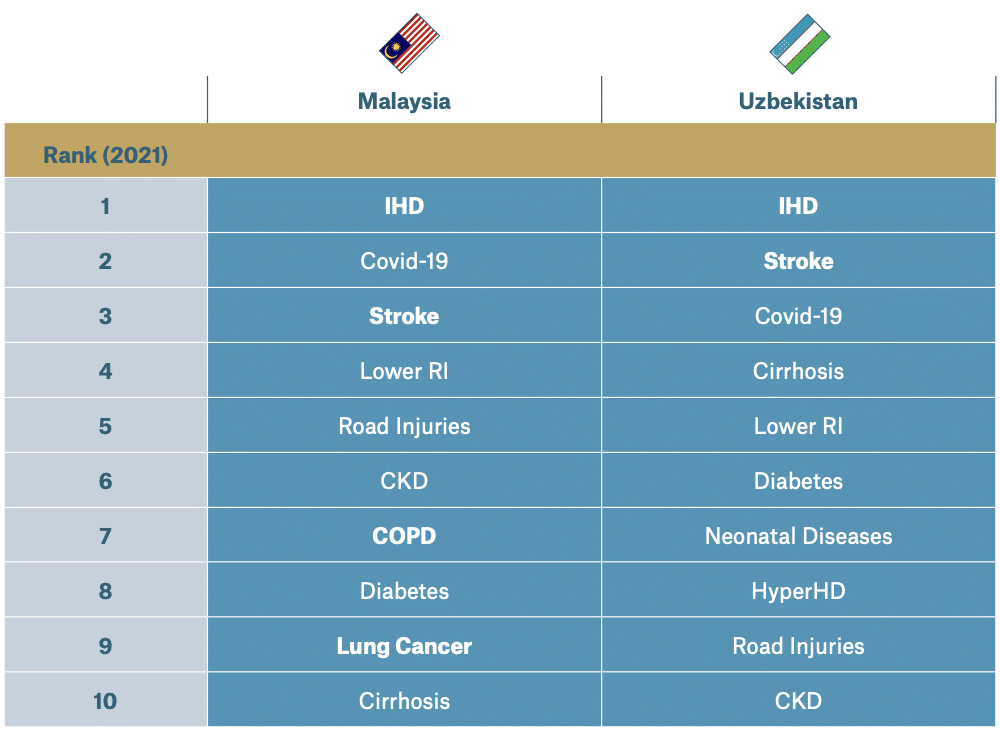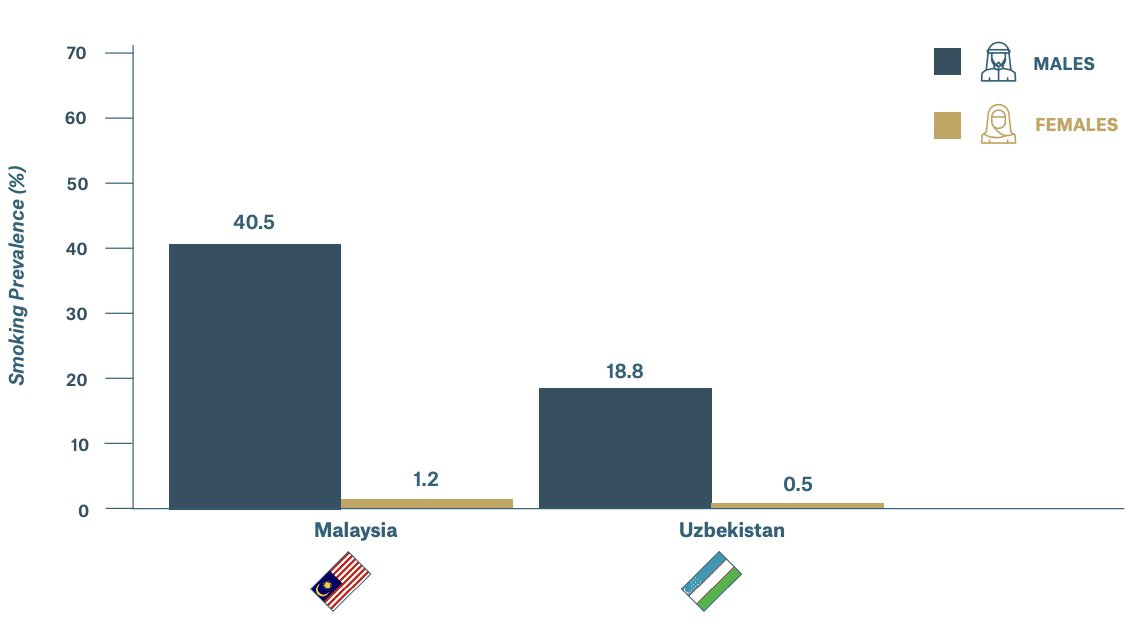In a groundbreaking report, 17 leading global health experts unveil how nearly 880,000 lives in Malaysia and Uzbekistan could be saved by 2060 through the adoption of tobacco harm reduction strategies and enhanced cancer treatments. As traditional tobacco control measures stagnate, this study calls for urgent action to integrate innovative solutions into public health policies.
Health crises increasingly demand innovative, pragmatic, and science-based responses prioritizing collective interests. In this context, a new report emerges as a beacon of hope.
The report titled “Lives Saved Report: Tobacco Harm Reduction and Better Treatment Could Save Nearly 880,000 Lives Up to 2060 in Malaysia and Uzbekistan,” authored by a distinguished group of international experts including Abbas Raza, Alisher Sharipov, Andrzej Sobczak, Anoop Misra, Damin Asadov, Delon Human, Derek Yach, Diego Verrastro, Gintautas-Yuozas Kentra, Heino Stöver, John Oyston, Karl Fagerström, Marewa Glover, Mihaela Răescu, Riccardo Polosa, Sharifa Ezat Wan Puteh, and Solomon Rataemane, details how the implementation of tobacco harm reduction strategies, coupled with improved treatments, could save nearly 880,000 lives in Malaysia and Uzbekistan by 2060.
This finding, supported by an international group of experts, underscores the urgent need to integrate Tobacco Harm Reduction into public health policies to reduce tobacco-related diseases drastically.
Highlights
• Global Stagnation in Smoking Reduction: WHO projects that 1.27 billion people will still be smoking by 2025, with more than 8 million annual deaths, underscoring the urgent need for new tobacco control strategies.
• Impact of Smoking in Malaysia and Uzbekistan: Both countries face high rates of tobacco-related diseases and deaths, including lung cancer, cardiovascular diseases, and COPD.
• Potential of Tobacco Harm Reduction: Products like e-cigarettes and heated tobacco, which eliminate combustion, offer significantly less harmful alternatives for smokers.
• Predictive Models of Lives Saved: The report estimates that up to 880,000 lives could be saved in Malaysia and Uzbekistan by 2060 through the adoption of THR policies, better cessation services, and improved lung cancer treatment.
• Public Policy Recommendations: The report urges governments to engage healthcare professionals in promoting THR, regulate nicotine products proportionally to their risk, and involve religious leaders in cessation and harm reduction strategies.
• Challenges and Need for Local Research: The report highlights the challenges of misinformation about nicotine and the lack of specific local studies in Malaysia and Uzbekistan, emphasizing the importance of investing in local scientific research to support these policies.
The report “Lives Saved Report: Tobacco Harm Reduction and Better Treatment Could Save Nearly 880,000 Lives Up to 2060 in Malaysia and Uzbekistan” is a comprehensive analysis highlighting the potential of tobacco harm reduction policies and improvements in lung cancer treatment to save up to 880,000 lives in Malaysia and Uzbekistan by 2060.

Data: IMHE country profiles. https://www.healthdata.org/research-analysis/health-by-location/profiles
Source: Lives Saved Report: Tobacco Harm Reduction and Better Treatment Could Save Nearly 880,000 Lives Up to 2060 in Malaysia and Uzbekistan

Data: WHO report on the global tobacco epidemic 2023 country profiles
Malaysia: https://www.who.int/publications/m/item/tobacco-mys-2023-country-profile
Uzbekistan: https://www.who.int/publications/m/item/tobacco-uzb-2023-country-profile
Source: Lives Saved Report: Tobacco Harm Reduction and Better Treatment Could Save Nearly 880,000 Lives Up to 2060 in Malaysia and Uzbekistan
The Global Stagnation of Smoking: Is It Time to Change Strategy?
Globally, progress in reducing smoking has stalled. The World Health Organization (WHO) projects that 1.27 billion people will still be smoking by 2025, with smoking claiming more than 8 million lives annually. Traditional tobacco control strategies have not been sufficient to halt this epidemic, making it necessary to explore new solutions such as harm reduction.
United for Health: Global Harm Reduction Experts Lead Initiative to Save Lives
This report was prepared by a multidisciplinary team of international experts in tobacco harm reduction, including Derek Yach, Sharifa Ezat Wan Puteh, Delon Human, and other prominent public health professionals and tobacco researchers. These authors come from various countries and fields, providing a global and well-informed perspective on the issue.
Innovative Strategies Against Smoking: New Technologies and Treatments to Reduce Mortality
The study presents an innovative strategy to reduce smoking-related mortality in Malaysia and Uzbekistan by implementing tobacco harm reduction (THR) products such as e-cigarettes, heated tobacco products, and nicotine pouches. It also advocates for improving smoking cessation services and lung cancer treatment.
Malaysia and Uzbekistan at the Center of the Debate: Two Countries, One Common Approach Against Smoking
The report focuses on two specific countries, Malaysia and Uzbekistan, nations that, despite their cultural and economic differences, face similar public health challenges related to smoking.
Vital Projections: 880,000 Lives Could Be Saved with New Health Policies by 2060
The report projects that adopting these policies could save up to 880,000 lives between 2020 and 2060. This projection is based on models considering different scenarios of THR adoption and improvements in healthcare.
Predictive Models Reveal the Potential of Harm Reduction: Three Scenarios, One Smoke-Free Future
The report uses predictive models to estimate the impact of THR policies and better healthcare services on smoking-related mortality. Three scenarios are presented: continuing current policies, adopting THR products, and combining THR with improved lung cancer diagnosis and treatment. The results show that adopting THR could reduce tobacco-related deaths by up to 50% by 2060.
For those interested in delving deeper into the details of this report, a comprehensive presentation is available on YouTube. The report presentation provides an in-depth look at the strategies needed to address these countries’ tobacco-related public health crises.
The session begins with an introduction by Jessica Perkins, who sets the stage for the subsequent discussions and analyses. At 06:08, Dr. Derek Yach, founder of the Foundation for a Smoke-Free World, delivers the keynote speech.
Yach, a renowned global health consultant specializing in smoking cessation, mental health, and healthy diets, emphasizes the importance of integrating innovative approaches into public health policies.
He draws on his pioneering work, shaping health policies worldwide. Dr. Derek Yach warns that traditional tobacco control policies in Malaysia are falling short.
“As smoking rates stagnate, policymakers in Malaysia must recognize that traditional tobacco control measures are not achieving the desired outcomes. Our report shows that sensible harm reduction measures can be a highly effective strategy to promote smoking cessation and reduce the incidence of tobacco-related diseases,” Yach stated.
Following this, at 20:07, Prof. Dr. Sharifa Ezat Wan Puteh addresses the specific situation in Malaysia.
As a physician with a PhD in Health Economics and extensive experience in health policy, inequality, and economics, Prof. Dr. Wan Puteh, who also serves as vice dean at UKM and advises several Malaysian ministries, underscores the importance of an economic and equitable approach in implementing harm reduction policies.
Finally, at 24:39, Dr. Delon Human concludes the presentation by focusing on the need for a global strategy for tobacco harm reduction.
With advanced studies in family medicine and child health from South Africa and Oxford and has served as Secretary-General of the World Medical Association and the International Food and Beverage Alliance, Dr. Human brings a global perspective to the debate, highlighting the importance of access to healthcare and research in pediatric endocrinology and diabetes.
This report offers rigorous analysis and provides a roadmap for governments to take decisive action.
The adoption of harm reduction strategies could be the paradigm shift needed to reduce the burden of tobacco-related diseases and save hundreds of thousands of lives in the coming decades.
See the Report here:


